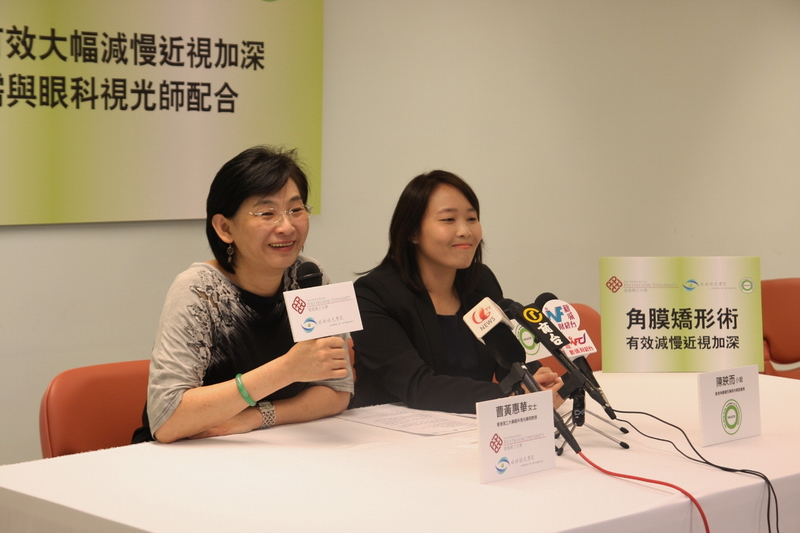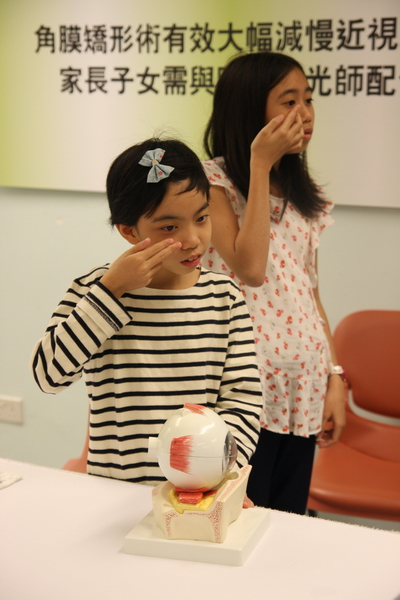The Hong Kong Polytechnic University (PolyU) and The Hong Kong Academy of Orthokeratology jointly held a press briefing today to announce results of the studies on the effectiveness in controlling the progression of myopia. The findings showed that the orthokeratology (Ortho-K) could slow down myopic progression by about 60% in school children.
Retarding myopic progression and eyeball elongation by 60%
Professor Pauline Cho of School of Optometry from PolyU commented that prevalence of myopia (short-sightedness) was reaching epidemic proportions in the last decade. Severe myopia increased the risk of sight threatening diseases such as glaucoma, macular degeneration and cataract. Thus, myopic progression is a major health issue which bothers parents.
To this end, research team of PolyU’s School of Optometry has conducted a number of researches on the effectiveness in controlling the progression of myopia in children. One of the studies completed in 2012 invited 78 children aged from 7 to 10 years old with myopia between 0.50D to 4.00D. The results showed that myopic progression of those 37 children who received Ortho-K treatment were 43% slower compared with the rest of 41 children who wore spectacles. The effectiveness of the Ortho-K treatment was more significant in children aged between 7 to 8 years old. The study also found that 65% of children, whose myopia progressed annually by more than 1.00D, were wearing spectacles while only 20% of them had received Ortho-K treatment.
Another clinical study completed in 2013 was conducted among children aged from 8 to 11 years old with myopia more than 5.00D. 12 of them received Ortho-K treatment while 16 of them wore spectacles. After two years, students who received Ortho-K had myopia increased by 0.13D whereas for those who wore spectacles, myopia increased by 1.00D. Myopia occurs when the eyeball is too long. The longer it is, the higher the degree of myopia. This study showed that Ortho-K slowed down eyeball elongation by 63%, meaning treatment is effective in alleviating myopic progression.
Another study completed in 2013 targeted at children with myopia and astigmatism. 58 children from 6 to 12 years old with myopia between 0.50D to 5.00D and astigmatism between 1.25D to 3.50D were invited to participate in the study. The two-year clinical study reported that eyeball axial elongation of 35 children who received Ortho-K treatment was 0.31mm while 23 children who wore spectacles, the axial of eyeball elongated 0.64mm. This study indicated that Ortho-K treatment was an effective way to slow down the progression of myopia in moderate to high astigmatic children by 52%.
Ortho-K is a non-surgical treatment to correct vision. Myopes are required to wear specially designed rigid gas-permeable contact lenses at night. They can improve vision in the daytime without the need to wear spectacles or contact lenses. This brings convenience to daily life. Children aged from 6 to 11 years old can also benefit from Ortho-K treatment to retard myopic progression.
Precautions with children wear
The Vice President (Internal) of The Hong Kong Academy of Orthokeratology, Ms Chan Ying-yee mentioned that Ortho-K lenses were tailor-made rigid contact lenses with high oxygen permeability that should only be prescribed by qualified optometrists after performing comprehensive eye examination. In general, about 60% of myopia could be reduced after 1 to 2 days of treatment and complete reduction of myopia could be achieved after 1 to 2 weeks of treatment. Ms Chan said that most optometrists recommend children aged 7 years old or above only to try Ortho-K treatment.
Since Ortho-K contact lenses are to be worn every night, children must be self-disciplined and strictly follow the instructions provided by optometrists. Therefore, parental support and monitoring are essential to ensure good compliance. Parents must assist their children in wearing and cleaning lenses, and arrange regular eye examination for them to ensure their eyes are in good condition. Hence, parents and children shall collaborate with optometrists to achieve the best outcome.
*****

